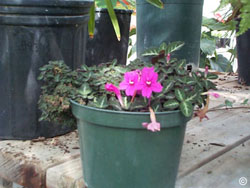
What is the False African Violet
The False African violet is a member of the true African violet family and is native to East Africa. They grow into cascading vines in their native habitat and are known for their soft fuzzy foliage. They produce delicate blue-violet and white flowers under optimal conditions. In Colorado False African violets can be used as a potted plant or in a hanging basket.
How much light do they need?
False African violets need medium to high light to grow well and produce flowers. Keep the potting mix evenly moist. This plant will tend to get lanky if not pinched.
What temperatures do these plants thrive in?
False African violets like temperatures around 70 degrees Fahrenheit during the day and 55 to 60 degrees at night. If you keep your plant on a window sill, protect it from cold and drafts because they are very prone to cold. False violets thrive in 20 to 40 percent humidity and should be fertilized every month with a half-strength solution of an all-purpose soluble fertilizer. When planting a False African violet, use a potting mix that drains well.
How are the plants propagated?
False African violets are commonly propagated by stem cuttings. Stem cuttings should be four inches long with the bottom leaves removed. Stick the cutting directly into potting mix, or place it in a glass of water until roots begin to form, then plant the cutting.
What bugs are interested in this plant?
False African violets occasionally attract pests including cyclamen mite and spider mite. Diseases include viruses, and stem and root rots.
For additional information, see the Planttalk Colorado™ script
For more information, see the following Colorado State University Extension fact sheet(s).



